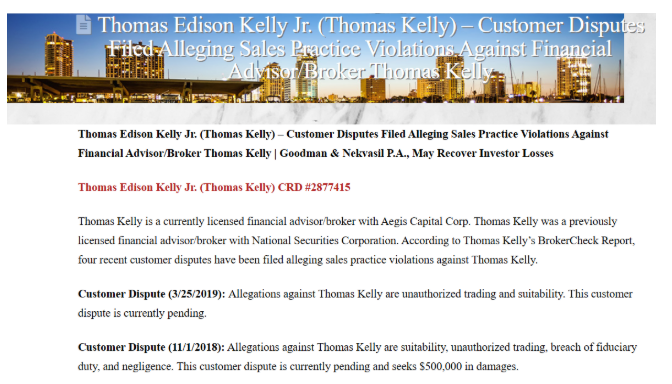Introduction: A Tarnished Legacy in Finance
The financial advisory industry thrives on trust, expertise, and ethical conduct. Financial advisors are entrusted with the life savings and financial aspirations of their clients, making their role both critical and sensitive. However, when allegations of misconduct arise, the consequences can be devastating for investors and the industry’s reputation. Thomas Kelly, a financial advisor with over twenty years of experience, currently employed by Aegis Capital Corp. in New York City, embodies this paradox. Despite his extensive career and affiliations with prestigious brokerage firms, Kelly’s professional journey is overshadowed by a series of client disputes, regulatory scrutiny, and allegations of unethical practices. This article delves into Kelly’s background, the numerous accusations against him, and the broader implications for investors and the financial advisory industry, highlighting the critical need for accountability and robust regulation.

Thomas Kelly: A Seasoned Yet Controversial Figure
Early Career and Professional Journey
Thomas Kelly embarked on his career in the securities industry in 1997, quickly establishing himself as a knowledgeable broker and financial advisor. Over the years, he worked with several notable firms, including National Securities Corporation, Northeast Securities, Nichols, Safina, Lerner & Co., and First Republic Group. His tenure at National Securities lasted a decade, while he spent eight years at First Republic Group before joining Aegis Capital Corp. in 2018. These affiliations with prominent firms underscored Kelly’s deep understanding of investment strategies and financial markets, earning him a reputation as a seasoned professional.
However, Kelly’s career has not been without significant blemishes. His time at First Republic Group ended amid regulatory turmoil when the Financial Industry Regulatory Authority (FINRA) forced the firm out of the market in 2019. Additionally, a 2017 Reuters investigation flagged National Securities Corporation as one of 48 firms employing brokers with problematic records, raising early concerns about Kelly’s professional environment. These red flags set the stage for the numerous client disputes that would later define his career.
Reputation and Expertise Undermined
Kelly’s extensive experience in the financial sector should have positioned him as a trusted advisor for clients seeking to grow their wealth. His knowledge of market dynamics and investment strategies was well-regarded, and his long tenure suggested a level of competence and reliability. Yet, this reputation has been severely undermined by a persistent pattern of client complaints and allegations of misconduct. Accusations ranging from dishonest trading to poor financial counsel have painted a troubling picture of Kelly’s advisory practices, suggesting systemic issues in his approach to client relationships and regulatory compliance.
The Weight of Client Disputes: A Pattern of Misconduct
Unresolved Complaints: Ongoing Legal Battles
The Financial Industry Regulatory Authority’s BrokerCheck database provides a detailed account of Kelly’s professional conduct, revealing fifteen consumer complaints accusing him of various sales practice violations. Among these, three unresolved complaints stand out, each highlighting serious allegations of misconduct:
March 2020: A client accused Kelly of unsuitability, breach of fiduciary responsibility, and breach of contract. The dispute, which remains unresolved, seeks $50,000 in damages. The allegations suggest that Kelly recommended investments that were misaligned with the client’s financial goals or risk tolerance, a fundamental violation of advisory standards.
February 2020: Another client alleged negligence, unsuitability, misrepresentation, and omissions, claiming damages of $33,000. This case, still under investigation, points to potential failures in Kelly’s duty to provide transparent and accurate advice.
November 2018: A particularly significant complaint accused Kelly of unlawful trading, unsuitability, breach of fiduciary responsibility, and negligence, with the client seeking $500,000 in damages. The scale of this claim underscores the severity of the alleged misconduct and its financial impact on the client.
These unresolved complaints reflect ongoing concerns about Kelly’s adherence to ethical standards and regulatory requirements. The accusations of unsuitability, in particular, highlight a failure to tailor investment recommendations to clients’ specific needs, a cornerstone of responsible financial advising.
Settled Disputes: A History of Settlements
Beyond the unresolved complaints, Kelly has faced numerous other disputes that were resolved through settlements, further tarnishing his record. These cases, documented in FINRA’s BrokerCheck, include:
August 2018: A dispute involving inappropriate recommendations and other sales practice violations was settled for $200,000. The significant settlement amount suggests substantial financial harm to the client.
October 2018: Kelly personally paid a $30,000 settlement to resolve allegations of deception, negligence, and breach of fiduciary responsibility. This case indicates direct accountability for misleading or harmful advice.
June 2009: A $14,000 settlement addressed accusations of excessive trading, fraud, negligence, and misrepresentation, pointing to aggressive or unethical trading practices.
December 2008: Allegations of breach of contract, unsuitability, and violations of state and federal securities laws were settled for $18,000, further highlighting Kelly’s recurring issues with regulatory compliance.
June 2006: A substantial $88,000 settlement resolved claims of inappropriate trading and excessive commissions, suggesting that Kelly prioritized personal gain over client interests.
January 2005: A $75,000 settlement addressed complaints of churning (excessive trading to generate commissions) and inappropriate transactions, reinforcing the pattern of questionable practices.
While some complaints against Kelly were closed without action, and one from 2012 was dismissed, the recurring nature of these allegations is alarming. The consistent themes of unsuitable recommendations, unlawful trading, and breaches of fiduciary duty suggest deep-rooted issues in Kelly’s advisory methods, raising questions about his commitment to client welfare.

Financial and Regulatory Challenges: A Mounting Burden
A Significant Financial Lien
Kelly’s professional challenges extend beyond client disputes. According to his BrokerCheck report, he faces a $2.4 million judgment or lien, a substantial financial burden that could impact his ability to meet regulatory and client obligations. This lien adds another layer of complexity to Kelly’s career, potentially undermining his credibility and financial stability. For clients, this raises concerns about whether Kelly can prioritize their interests while grappling with such a significant personal financial issue.
Aegis Capital’s Broader Issues
Kelly is not the only advisor at Aegis Capital Corp. facing allegations of misconduct. Other financial advisors at the firm, including Alan Zelig Appelbaum, Michael Fasciglione, and Paul Falcon, have also been cited in client disputes. Appelbaum has sixteen disclosures on his record, including twelve customer disputes, while Fasciglione has thirteen complaints. Falcon, meanwhile, faced a thirty-day FINRA ban earlier this year and has six investor grievances listed. This pattern of problematic behavior among Aegis Capital’s advisors suggests potential deficiencies in the firm’s supervisory and compliance processes, amplifying concerns about the environment in which Kelly operates.

The Regulatory Framework: Protecting Investors
Suitability Obligations
Financial advisors like Kelly are bound by strict regulatory standards designed to protect investors. FINRA outlines three key suitability obligations:
Reasonable Basis Suitability: Advisors must conduct thorough due diligence to ensure that an investment strategy is suitable for at least some investors.
Quantitative Suitability: Advisors must ensure that a series of transactions is not excessive or inappropriate, particularly when managing a client’s account.
Customer-Specific Suitability: Recommendations must align with a client’s unique financial situation, goals, and risk tolerance.
Failure to adhere to these standards can result in significant financial losses for clients, as well as legal and regulatory consequences for advisors. The allegations against Kelly, particularly those involving unsuitability, suggest repeated violations of these obligations, exposing clients to unnecessary risks.
Investor Recourse: Seeking Justice
Investors who believe they have suffered losses due to Kelly’s alleged misconduct have several options for seeking redress. Securities arbitration, often facilitated by FINRA, provides a platform for resolving disputes without the need for costly litigation. Many securities arbitration firms offer free case assessments and work on a contingency fee basis, meaning investors incur no upfront costs. Legal action may also be pursued in cases of severe misconduct, offering affected clients a pathway to recover their losses and hold advisors accountable.
Implications for the Financial Advisory Industry
The Need for Accountability
The allegations against Thomas Kelly underscore the critical importance of accountability in the financial advisory industry. Advisors wield significant influence over their clients’ financial futures, and any breach of trust or ethical lapse can have far-reaching consequences. Kelly’s case highlights the need for robust oversight, both at the firm level and through regulatory bodies like FINRA. Firms must implement stringent compliance measures to prevent misconduct, while advisors must prioritize transparency and client-centric practices.
Investor Vigilance
For investors, Kelly’s troubled record serves as a cautionary tale. Conducting thorough due diligence before entrusting an advisor with one’s finances is essential. Tools like FINRA’s BrokerCheck allow investors to review an advisor’s history, including any complaints or disciplinary actions. Investors should also seek advisors who demonstrate a clear commitment to ethical conduct and regulatory compliance, minimizing the risk of financial harm.
Systemic Issues at Aegis Capital
The broader pattern of misconduct among Aegis Capital’s advisors raises questions about the firm’s culture and oversight. When multiple advisors within a single firm face similar allegations, it suggests potential systemic issues that warrant closer scrutiny. Regulators and investors alike should examine whether Aegis Capital’s supervisory practices are adequate to protect clients and uphold industry standards.

Conclusion: A Sobering Reminder
Thomas Kelly’s career, once marked by promise and expertise, has been irrevocably tainted by a trail of client disputes and allegations of misconduct. From unsuitable investment recommendations to unlawful trading and breaches of fiduciary duty, the accusations against him paint a troubling picture of an advisor who has repeatedly failed to uphold his ethical and regulatory obligations. The $2.4 million lien against him and the broader issues at Aegis Capital only deepen concerns about his reliability and the firm’s oversight.
For investors, Kelly’s case is a stark reminder of the importance of vigilance and due diligence. By researching advisors, understanding their obligations, and seeking legal recourse when necessary, investors can protect themselves from financial harm. For the financial advisory industry, this case underscores the need for stringent regulations, robust compliance measures, and a steadfast commitment to ethical conduct. Only through these efforts can the industry maintain the trust and confidence of the clients it serves.







